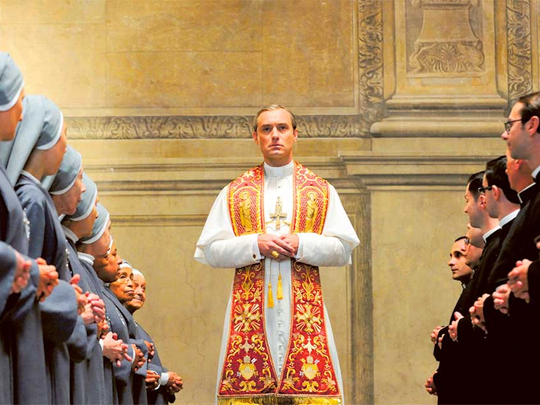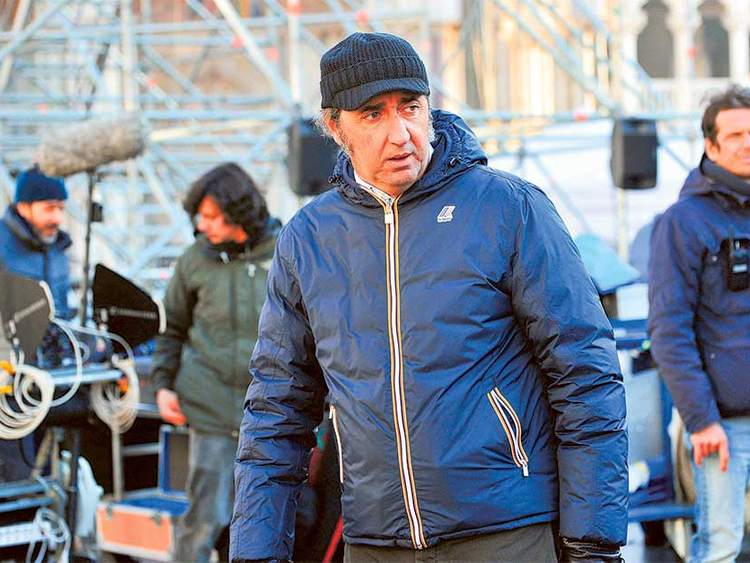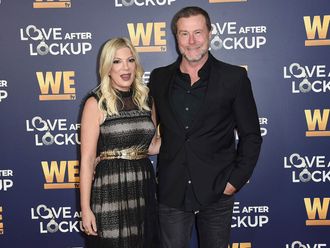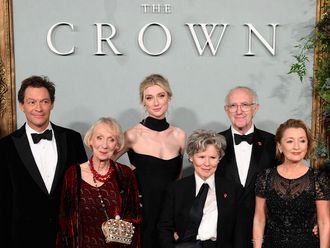
Jude Law knows what you’re thinking.
An HBO series called The Young Pope, starring one of Hollywood’s most dashing leading men in the title role?
“Everyone was expecting, with me in the part and the name, oh, it’s going to be choir boys and prostitutes at the Vatican,” said Law, relaxing in his hotel suite on a bright afternoon in November. Instead, the most scandalous thing about Law’s character, a youthful but arch-conservative American pontiff, born Lenny Belardo, is his penchant for chain-smoking and guzzling Cherry Coke Zero.
Written and directed by Paolo Sorrentino, the 10-episode limited series defies easy categorisation, even if its seemingly straightforward title has already inspired a popular Twitter meme. Dreamlike and methodically paced, The Young Pope is more interested in Big Questions of belief and the allure of tyranny than behind-the-scenes intrigue.
Though it is (relatively) light on the nudity and beheadings, the series is classic HBO — filmed on location in Italy, with sumptuous production values and A-list talent (Diane Keaton co-stars as Sister Mary, one of Lenny’s closest confidantes).
The Young Pope is Law’s first foray into series television in nearly two decades. While it’s become increasingly fashionable for movie stars of his stature to dabble in the small screen, the actor, 44, claims he’s agnostic about medium and was more drawn to the opportunity to work with Sorrentino.
“There was a humanity, a wit, an ability to take quite personal stories and somehow elevate them to being global,” said Law of Sorrentino films including Youth and the Oscar-winning The Great Beauty.
Dressed in harem-style sweatpants and a cashmere hoodie, Law comes off as a bit of an aesthete; even his leisure wear makes a statement. He trusted himself in the hands of Sorrentino, a filmmaker with a flair for surreal imagery — The Young Pope opens with a dream sequence of a naked baby crawling on a pile of dolls — that can seem puzzling to the actors trying to bring it to life.
“It’s a director’s medium, and you’re there to be a colour on the palette,” he said. “If you trust them enough, you know that it will make sense in its entirety.”
In turn, Sorrentino says he was looking for a performer who could capture the “juxtaposition between childishness and virility, innocence and power” that characterises Lenny, elected by cardinals who foolishly expect him to be their “telegenic puppet.”
Instead Lenny wields his power mercilessly, ushering in a new era of conservatism and dogmatism at the Vatican. He dresses down an elderly nun for greeting him with a kiss and takes the name Pius XIII, a callback to a more traditional era in the church.
Though he was not raised in a particular religion, Law takes an a la carte approach to belief, “gathering what I see as personally affecting from all faiths.”
“And like every other teenager, I dabbled with a bit of Buddhism,” he added.
To prepare for The Young Pope, the actor read papal diaries and church histories and was even granted a tour of parts of the Vatican. He was impressed by the presence of seemingly mundane facilities — a bank, a laundry, a pharmacy where “haemorrhoid cream sells very well,” he says with a laugh.
But ultimately it was more useful to focus on Lenny’s humanity rather than the institution he represents. He and Sorrentino, who describes Law as “an additional screenwriter,” spent a great deal of time discussing Lenny’s childhood and its effect on his faith.
Abandoned by his hippie parents, Lenny was raised by nuns in an orphanage, never feeling loved and believing that God would fill the void. Sister Mary is a kind of surrogate stage mother to Lenny — the Mama Rose to his Gypsy, Law jokes. (Keaton, he says, referred to him as “your eminence” throughout the production.) The actor’s parents were both adopted and, while they grew up in much different circumstances than Lenny, “I had an emotional attachment to what it is like to be an orphan,” he said.
Lenny is the opposite of the current Pope Francis, whose modesty and inclusive tone have endeared him to many. And this is quite by design, said Sorrentino, who was interested in exploring how the church might respond to Francis in the future. “In the Vatican too, like in other states, an alternation between progressiveness and conservatism is plausible.”
Lenny immediately orders a ban on photographs and merchandise bearing his image — not out of humility but because he wants to make himself as “unreachable as a rock star,” as mysterious as Daft Punk, Banksy or Stanley Kubrick. He delivers his first address at night, under the cover of darkness, so that no one can see his face.
Asked whether he sympathises with Lenny’s basic assumption — that an air of mystery can be beneficial to an artist — Law replies with an enthusiastic “hell, yes.”
“Some of my greatest regrets are not being guided as a young actor. No one tells you you don’t have to do the photos. You look back and you think... why did I let all that stuff in? But also why did I give all that stuff away?”
At times, “that stuff” has also been taken from Law, whose personal life has been the subject of almost relentless tabloid scrutiny since The Talented Mr. Ripley catapulted him to fame 17 years ago, most notably in the hacking of his voicemail by reporters at the News of the World.
And yet despite this, Law is refreshingly unguarded, meeting in his hotel room without a publicist. Gracious and polite, he pauses frequently to consider questions he’s asked in a way that seems thoughtful rather than circumspect.
Although he calls the media scrutiny “deeply exhausting,” he’s never considered walking away from acting — at least not seriously. “Since people have been hunting and eating and cohabiting, we’ve also told each other stories. It’s a beautiful aspect of our communities. Why stop that?”
Law says he’s guided by a creative restlessness rather than any overarching career plan. He recalls seeing John Gielgud in Peter Greenaway’s Prospero’s Books. “Here was this 80-something-year-old man performing naked and still putting himself out there. I just thought, ‘What a career. Still doing stuff that probably scares the life out of you.’”
While Sorrentino is writing a potential second season of The Young Pope, Law is coy about his possible return. For now he’s focused on other projects, including a stage version of Luchino Visconti’s Obsession, directed by Tony-winning Ivo van Hove, at the Barbican in London this spring.
“I’m curious,” he says. “That’s my religion.”














